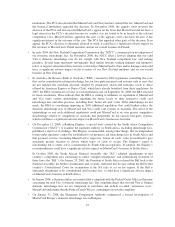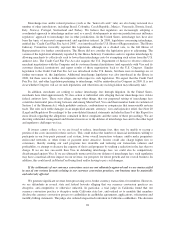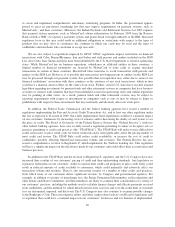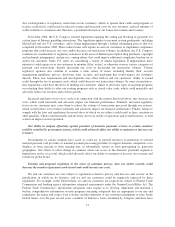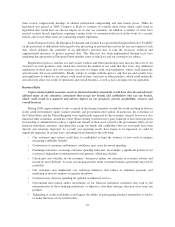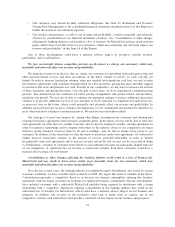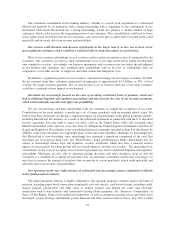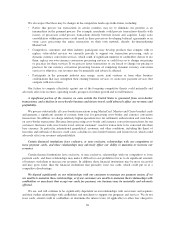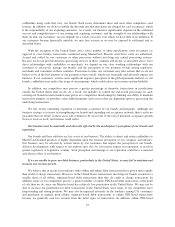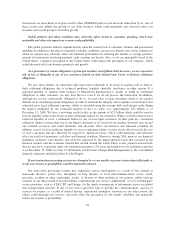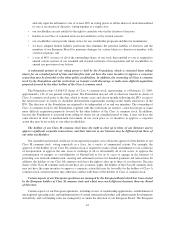MasterCard 2008 Annual Report Download - page 45
Download and view the complete annual report
Please find page 45 of the 2008 MasterCard annual report below. You can navigate through the pages in the report by either clicking on the pages listed below, or by using the keyword search tool below to find specific information within the annual report.range of programs and services than we offer or may use more effective advertising and marketing strategies to
achieve broader brand recognition or merchant acceptance than we have.
Among other companies in our industry, Visa and Discover have changed their ownership structures, which
could result in them becoming stronger and more efficient companies within the global payments industry. In
October 2007, Visa completed its plan to restructure its organization through the creation of a new stock
corporation, Visa Inc., owned by its current member financial institutions. As part of the reorganization, Visa
Europe did not become a subsidiary of Visa Inc., but rather remained owned by various European member
financial institutions. Visa Inc. completed its initial public offering in March 2008. In July 2007, Discover began
trading on the New York Stock Exchange as a publicly-traded company following its spin-off from Morgan
Stanley. As publicly-owned companies, Visa and Discover, among other changes, may have enhanced access to
the capital markets and may improve operating results, which could be used to enhance their competitive
position. If we are unable to compete effectively with these companies, then use of our programs and products
could decline, which would have an adverse impact on our revenues.
In the U.S., in 2008, American Express and Discover received approval to become bank holding companies.
While bank holding companies are subject to numerous regulatory requirements, they also are eligible to request
an investment from the U.S. government under the TARP and may be eligible for similar government programs
in the future. American Express announced in December 2008 that it had requested and was approved to receive
a $3.39 billion investment from the U.S. government under the TARP, and Discover announced in January 2009
that it had requested and was preliminarily approved to receive a $1.2 billion investment under the TARP.
MasterCard is not a bank holding company and is not eligible to receive such an investment. A TARP or similar
investment could strengthen such competitors of MasterCard.
Based on a final judgment in 2004 of our litigation with the U.S. Department of Justice concerning our
former CPP, our customers are now permitted to issue general purpose credit or debit cards in the United States
on any other general purpose card network (such as American Express or Discover). This may cause our
customers to issue fewer cards with our brand and to enter into arrangements with our competitors to issue cards,
thereby reducing the volume of transactions that we process and decreasing our revenues. A number of our large
customers, including Bank of America, Citibank, HSBC, USAA and GE Money, now issue or have announced
that they will issue American Express or Discover-branded cards. Accordingly, if our customers issue more
competitor branded cards than MasterCard branded cards, it may have a material adverse affect on our business,
revenue and profitability.
Certain of our competitors, including American Express, Discover, private-label card networks and certain
alternative payments systems, operate end-to-end payments systems with direct connections to both merchants
and consumers, without involving intermediaries. These competitors seek to derive competitive advantages from
their business models. For example, operators of end to end payments systems tend to have greater control over
consumer and merchant customer service than operators of four party payments systems such as ours, in which
we must rely on our issuing and acquiring financial institution customers. In addition, these competitors have not
attracted the same level of legal or regulatory scrutiny of their pricing and business practices as have operators of
four party payments systems such as ours.
If we are not able to differentiate ourselves from our competitors, drive value for our customers and/or
effectively align our resources with our goals and objectives, we may not be able to compete effectively against
these threats. Our competitors may also more effectively introduce innovative programs and services that
adversely impact our growth. As a result, our revenue or profitability could decline. We also compete against
new entrants that have developed alternative payment systems and payments in electronic commerce and for
mobile devices. A number of these new entrants rely principally on the Internet to support their services and may
enjoy lower costs than we do, which could put us at a competitive disadvantage.
35




